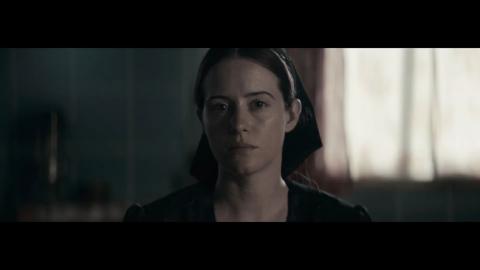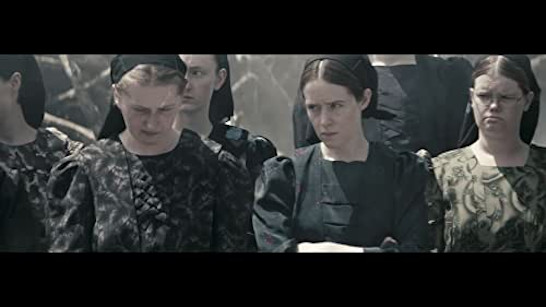A Remote Religious Colony Sets the Scene for the Harrowing Drama ‘Women Talking’

AT A GLANCE
“Women Talking”
Directed by: Sara Polley
Starring: Rooney Mara, Claire Foy, Jessie Buckley, Judith Ivey, Frances McDormand and Ben Whishaw
Rated: PG-13 for mature thematic content including sexual assault, bloody images, and some strong language
Available: In theaters
Critical rating: 3½ stars out of 4
“Women Talking” is a harrowing drama that transports viewers to a remote religious colony, where the unthinkable has occurred. Colony members discover that several male members have repeatedly drugged and sexually assaulted women in the community.
At first, this revelation is met with outrage, but when community women become particularly aggressive, the attackers are removed “for their own protection.” Soon after, the women are told by community leaders that they must – as their religion demands – forgive the assailants and welcome their return. The women then have a short window to decide whether to accept this charge or stand up for themselves.

Although the film does not explicitly name a religious group, it is based on the 2018 novel by Miriam Toews, and she was inspired by a real-life situation where men from a Bolivian Mennonite colony drugged and sexually assaulted more than 150 women during the early 2000s. That makes “Women Talking” a work of fiction, but one that feels painfully real.
In the film, colony women initiate a vote where they must choose whether to forgive the men, stay and fight for more rights, or leave. When the ballots are counted, only the latter two options remain, and a small group of female leaders is asked to discuss options and decide for all colony women.
On the surface, their path seems obvious. Of course, the women should flee the abusers and the countless men who enabled them. But that choice ignores the complexities of the human condition. For these women, leaving means more than abandoning familiar surroundings. It means coming to terms with an outside world they have never known and attempting to navigate that world with a skillset and value system foreign to nearly everyone they will meet. It means starting over with little money and virtually no understanding of what such an endeavor will require. For some, it means leaving older, male children who have been raised with the patriarchal values that endangered them in the first place. In short, there is no “good” choice, so they must settle for livable.
After a slow start, “Women Talking” falls into a rhythm that drags viewers through the dilemma, asking them to imagine themselves facing the choice. Do they stay, forgiving the men who violated them emotionally and physically, giving implicit approval to their actions by doing so? Or do they leave, uprooting themselves and (in some cases) their young children from the only existence they understand?

Helping with their decision is August (Ben Whishaw), the colony school teacher and the sole man asked to take part in the proceedings. August has returned to the community after being cast out due to his mother’s progressive beliefs. While exiled, he attended college, and he has a greater understanding of the outside world than any of the women who have been sheltered by their remote, rural life for decades. He is also literate, meaning he can record the minutes of the leadership discussion so that others can understand the gravity of the choice.
In a sense, “Women Talking” is little more than its name implies. This is, indeed, a movie about women debating, brainstorming, and in some cases fighting. There are no car crashes, explosions, or slapstick comedy sequences to redirect the attention of viewers or prevent them from being overwhelmed by the weight of the horrifying circumstances. Of course, director Sarah Polley does such a wonderful job with the material that none of these distractions would be welcome. What viewers see are real people talking about a situation of import and deciding where they begin and where their religious beliefs and community bonds end.
Polley’s cast is extraordinary. Leading the way is Rooney Mara, who plays Ona, a young woman carrying her rapist’s child. Despite the violation, she does not withdraw, and she challenges other women in the group repeatedly. A subplot makes it clear that August loves Ona and that she may share his feelings, but theirs is a star-crossed love. August is expected to remain in the colony to assure that his pupils are better men than their fathers. The cast also includes Claire Foy, Jessie Buckley, Judith Ivey, and – briefly – Frances McDormand. All are outstanding.
Despite recent attempts to diversify, men have long commanded more power than women both in front of and behind Hollywood movie cameras. That won’t change with one film (or even 100), but it is nice to see so much powerful female talent placed front and center.
“Women Talking” is a film that plays perfectly in a post-Roe v. Wade world, and viewers are clearly meant to think about the many recent assaults we have seen on women’s rights. A small, religious sisterhood may be at the center of this film, but the messaging targets everyone. Female viewers are asked to decide how many inequities are too many, and men must debate whether inaction in the face of misogyny is essentially support.
Author Bio:
Forrest Hartman is Highbrow Magazine’s chief film critic.
For Highbrow Magazine































































































































































































































































































































